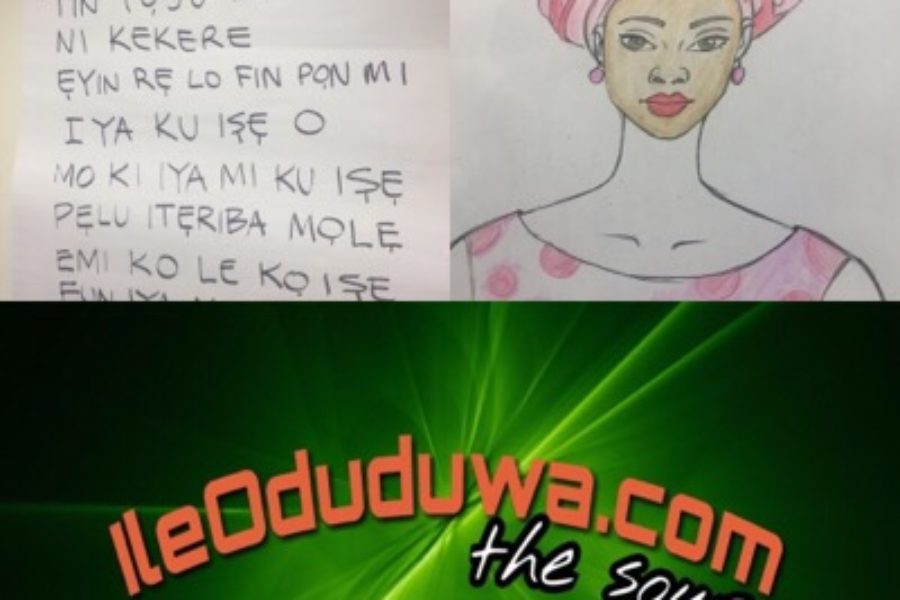
Week 5 of Odu’a Youth Yoruba Class



Pronouns are words used instead of a noun.
For Example: Niyi jẹun – He eats
Niyi jẹun – Ó jeun
“Ó” is used instead of Niyi
“Ó” is used as pronoun for He, She or it
Forms of Pronouns and Usages
English Yoruba Example Useage
I Mo e.g. I sleep=Mo sùn
You O e.g. You sleep=O sùn
He/She/It Ó. e.g. He/she/it sleep=Ó sùn
They Wọn. e.g. They sleep=Wọn sùn
We. A e.g. We sleep=A sùn
You (Pl) Ẹ e.g. You sleep=Ẹ sùn
Second sets of pronoun still on the use of I, You, He, She, it and they.
They can take other forms when:
Laying Emphasis on person/s.
I am – Èmi ni
You are – ìwọ ni
They are – Àwọn ni
We are – Àwa ni
She/He – òun ni
You (plural) are – Ẹ̀yin ni
It is Niyi – Niyi ni
Making a negative Statement
I am not or – Èmi kọ́
You are not or It is not you – Ìwọ kọ́
They are not or It is not they – Àwọn kọ́
Bayo is not or It is not Bayo – Bayo kọ́
Introducing Oneself / A Thing
I am Adeniyi – Èmi ni Adeniyi
I am not Tokunbọ – Èmi kọ́ ni Tokunbọ
He is not Dayọ – Òun kọ́ ni Dayọ
We are Taiwo and Kehinde – Àwa ni Taiwo àti Kehinde.
In summary, these pronouns have two forms each:
I – Mo or Èmi
You – O or Ìwọ
They – Wọn or Àwọn
We – A or Àwa
He/She/ It – Ò or Òun
You (pl) – Ẹ or Ẹ̀yin
Èmi, Ìwọ, Àwọn, Òun, Ẹ̀yin are also known as pronominals.
Third set of Pronouns are:
My – Mi. Our – Wa
Your – Rẹ. Their – Wọn
His/Her – Rẹ̀. Your (plural) – Yin
LÍLÒ
My book – ìwé mi
Not my book – Ìwé mi kọ́
Your chair – Àga rẹ
Not your chair – Àga rẹ kọ́
His/Her chair – Àga rẹ̀
Their house – Ilé wọn
Our teacher – Olùkọ́ wa
Not out teacher – Olùkọ́ wa kọ́
Your (pl) teacher – Olùkọ́ yin
SENTENCE CONSTRUCTION
MO = I
FẸ = WANT, LIKE, LOVE
MI Ò = I DON’T
LỌ = GO
NLỌ = GOING
MBỌ̀ = COMING
NFẸ́ = LIKING, LOVING
SÍ = TO
NÍ = AT
MO FẸ́RÀN LÁTI WÁ SÍ ILÉ ẸKỌ́ YORÙBÁ
NFẸ́ = WANTING, LOVING
TÍÌ = HAVE NOT
ÌWỌ = YOU
ÈMI = ME
VOCABULARIES
TIME OF DAY AND CALENDAR:
Day – Ọjọ́
Morning – àárọ̀
Afternoon – Ọ̀sán
Evening – Alẹ́
Sunset – Ìrọ̀lẹ́
Work/Job – Iṣẹ́
Tomorrow – Ọ̀la
Today – Òní
Yesterday – Àná
Be watchful/sorry/take heart – Pẹ̀lẹ́
Week – Ọ̀ṣẹ̀
Month – Oṣù
Year – Ọdún
Time – Àsìkò, Àkókò
Period/Season – Ìgbà
Vocabularies
Ẹbi:
Home – ilé/ìdile
Man – Ọkùnrin
Boy – Ọmọkùnrin
Woman – Obìnrin
Girl – Ọmọbìnrin
Father – Bábà
Grandfather – Bábà-Àgbà
Mother – Ìyá
Grandmother – Ìyá-Àgbà
Parent – Òbí
Bride/Wife – Ìyàwó
Bridegroom – Ọkọ Ìyàwó
Husband – Ọkọ
Elder – Ẹ̀gbọ́n
Elder Brother – Ẹ̀gbọ́n Ọkùnrin
Younger – Àbúrò
Younger Brother – Àbúrò Ọkùnrin
Elder Sister – Ẹ̀gbọ́n Obìnrin
Person/Somebody – Ènìyàn

Students Coloring






 IleOduduwa.com the Source is ennobling this great culture and language of the Yoruba people is a worthy endeavor to undertake and continue to share with the world it’s rich history, heritage, traditions, culture, and language that is spoken by sixty million people around the world.
IleOduduwa.com the Source is ennobling this great culture and language of the Yoruba people is a worthy endeavor to undertake and continue to share with the world it’s rich history, heritage, traditions, culture, and language that is spoken by sixty million people around the world.